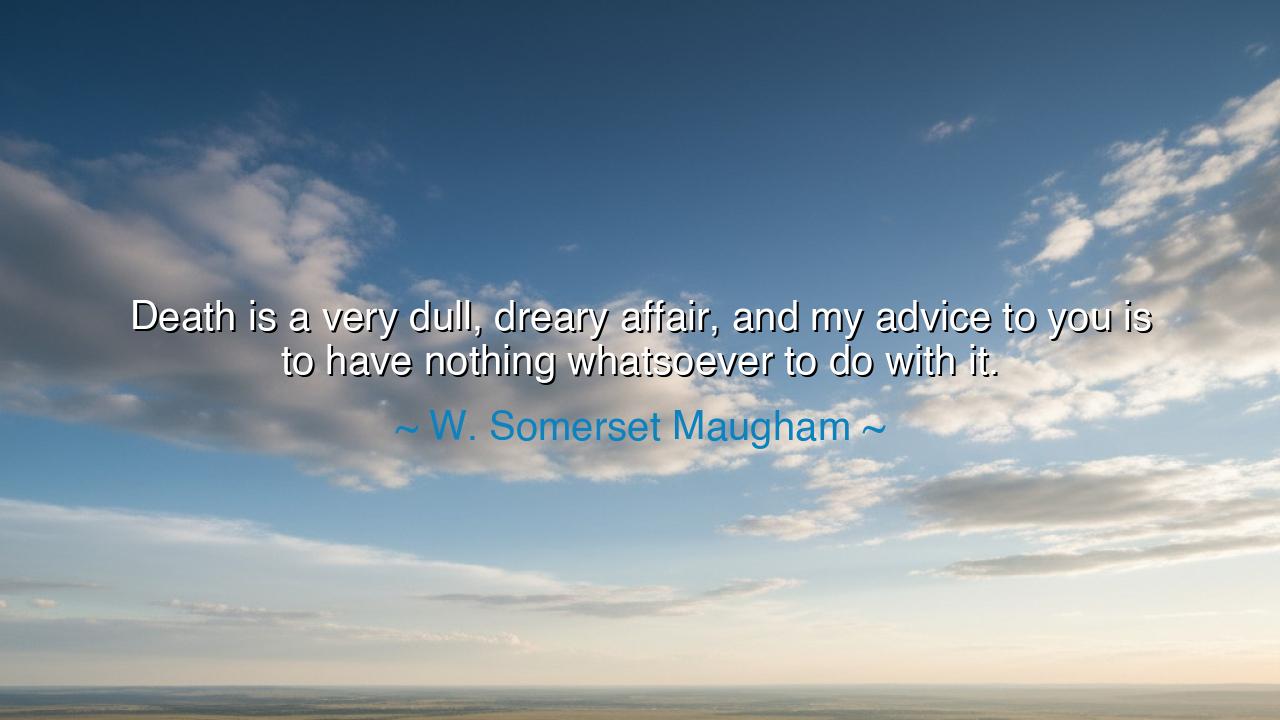
Death is a very dull, dreary affair, and my advice to you is to
Death is a very dull, dreary affair, and my advice to you is to have nothing whatsoever to do with it.






The words of W. Somerset Maugham, “Death is a very dull, dreary affair, and my advice to you is to have nothing whatsoever to do with it,” are cloaked in wit, yet carry a profound wisdom beneath their humor. Maugham, a man who gazed deeply into the complexities of human nature, knew that life itself is the grand theater, and death — though inevitable — is no stage worth rushing toward. In this seemingly playful remark, he delivers an ancient truth in a modern voice: that to dwell upon death is to forget the sacred vibrancy of living.
To the ears of the ancients, this would have sounded as a call to celebrate the flame rather than fear the shadow. Maugham’s disdain for death is not born from denial but from reverence for vitality. He tells us that death adds nothing to the story of a person — it is the closing silence after the music, not the melody itself. Thus, the wise man chooses to fill his song with passion, curiosity, and love, knowing that the silence will come soon enough.
In his long life, Maugham had seen war, disease, and despair. Yet he remained steadfastly devoted to observation, art, and experience. He understood, as did the philosophers of old, that the more one fixates on mortality, the more lifeless one becomes in spirit. Like Epicurus, who taught that death is nothing to us because we are not there to experience it, Maugham urges us to turn away from the sterile contemplation of the grave. Instead, he invites us to look outward — toward the laughter, labor, and light that make existence divine.
There is a story told of Leonardo da Vinci, who in his final days lamented, “I have offended God and mankind because my work did not reach the quality it should have.” Even as he faced death, Leonardo’s regret was not in dying, but in not living fully enough. He too, like Maugham, teaches us that life must be used to its fullest — that the tragedy is not that we die, but that we fail to live with courage, curiosity, and creation while we can. To spend one’s time fearing death is to abandon the brush before the canvas is complete.
When Maugham calls death “dull” and “dreary,” he strips it of its mystery, perhaps even its power. The ancients would say he robs the Reaper of dignity, mocking it so that men might laugh instead of tremble. This is a kind of defiance — the rebellion of the living against the tyranny of fate. By laughing at death, Maugham lifts the soul above it. It is the same wisdom that echoed in the hearts of stoics and poets alike: you cannot escape death, but you can deny it dominion over your joy.
To “have nothing whatsoever to do with it” does not mean to ignore the truth of mortality, but rather to refuse to serve it. It means to resist despair, to shun the idle brooding that drains the sweetness from each passing day. One may acknowledge death as a fact, but never as a master. For as long as breath remains, there is beauty to be found — in conversation, in creation, in love, and even in struggle. Life is the sacred gift; death is but its shadow, and shadows vanish in the light of purpose.
So, let this lesson be carried forward to those who listen: Do not flirt with death by neglecting life. Rise early, work earnestly, laugh deeply, and let no moment slip by unhonored. When sorrow visits, meet it bravely, for that too is part of living. Fill your days so richly that when death finally comes, it will find you too busy living to notice its arrival. In this, Maugham’s advice becomes more than humor — it becomes a commandment of joy: to live so fiercely that death itself seems dull by comparison.
Thus, as the ancients would have said, let your heart be the flame that denies the darkness. For though death awaits us all, only the living can choose how to burn.






AAdministratorAdministrator
Welcome, honored guests. Please leave a comment, we will respond soon